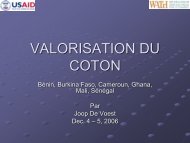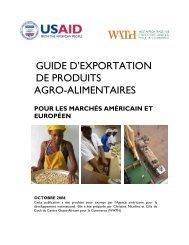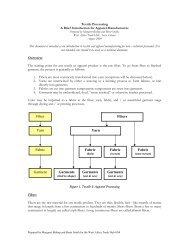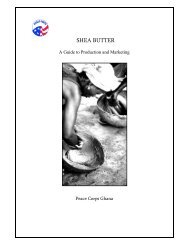A Value Chain Analysis of the Cashew Sector - AGOA Export Toolkit
A Value Chain Analysis of the Cashew Sector - AGOA Export Toolkit
A Value Chain Analysis of the Cashew Sector - AGOA Export Toolkit
You also want an ePaper? Increase the reach of your titles
YUMPU automatically turns print PDFs into web optimized ePapers that Google loves.
34 ÿ Geographical proximity to primary consumption<br />
ÿ Farm mapping and development <strong>of</strong> training on quality<br />
markets in <strong>the</strong> U.S. and Europe<br />
ÿ Associated employment opportunities (seasonal and<br />
permanent) for rural people<br />
ÿ Donor agencies that support cashew production<br />
ÿ Th e positive contribution <strong>of</strong> cashew trees in terms<br />
<strong>of</strong> desertifi cation, plus <strong>the</strong>ir resistance to drought.<br />
2.10 Proposals for <strong>the</strong> Strategic Orientation <strong>of</strong> Activities<br />
Promoting <strong>the</strong> <strong>Cashew</strong> <strong>Value</strong> <strong>Chain</strong><br />
Based on <strong>the</strong> strengths and bottlenecks identifi ed, it is recommended<br />
that interventions in <strong>the</strong> cashew value chain<br />
in Ghana should focus on <strong>the</strong> following areas:<br />
ÿ Scaling-up <strong>of</strong> extension and training activities to increase<br />
awareness <strong>of</strong> cashew production and processing through<br />
individual, group and mass extension methods (e.g. local<br />
radio programmes promoting good agricultural practices<br />
and sharing information on marketing).<br />
ÿ Streng<strong>the</strong>ning <strong>of</strong> farmers’ organisations at <strong>the</strong> local, regional<br />
and national levels: strong cashew farmers’ organisations<br />
can better defend <strong>the</strong> interests <strong>of</strong> this agricultural<br />
sub-sector at <strong>the</strong> political level. In this way, <strong>the</strong>y can contribute<br />
to improved legal, organisational and political<br />
frame conditions (e.g. in <strong>the</strong> area <strong>of</strong> tariff s, taxes and levies,<br />
etc). Fur<strong>the</strong>rmore, strong cashew farmers’ co-operatives<br />
help <strong>the</strong>ir members through improved access to<br />
credit, marketing (via economies <strong>of</strong> scales) or training.<br />
ÿ Increasing access to improved planting material (grafts)<br />
for farmers: two central nurseries have already made<br />
progress in producing improved planting materials. High<br />
yielding materials (with annual yields ranging from 8-15<br />
kg/tree) have been used to establish scion banks supplying<br />
scions for graft production purposes. Th ese nurseries have<br />
been developed through <strong>the</strong> combined eff orts <strong>of</strong> MOFA,<br />
CDP, and CRIG. It is suggested that <strong>the</strong> African <strong>Cashew</strong><br />
initiative should join in this initiative. Th e production <strong>of</strong><br />
grafts for planting helps increase smallholder access to<br />
better planting material, and <strong>the</strong>reby raises <strong>the</strong> productivity<br />
<strong>of</strong> Ghanaian farmers.<br />
ÿ Streng<strong>the</strong>ning research on cashew farming systems and<br />
<strong>the</strong> cashew value chain by national research institutes and<br />
universities (e.g. CRIG). Th e ACi could benefi t from research<br />
on cashew farming systems conducted by national<br />
universities, and take this into consideration in <strong>the</strong> strategic<br />
orientation <strong>of</strong> its support activities.<br />
standards and norms: Ghanaian cashews have to meet national<br />
and international quality standards in order to be<br />
competitive in national and global markets. Th is is why<br />
training on quality standards is <strong>of</strong> crucial importance to<br />
project success. TIPCEE and CDP have helped <strong>the</strong>ir local<br />
partners to map farms and to implement training in<br />
order to ensure that quality standards and norms are<br />
maintained. Th e ACi can continue <strong>the</strong> eff orts <strong>of</strong> TIPCEE<br />
and CDP here.<br />
ÿ Improving farmers’ and processors’ access to short- and<br />
long-term credit (for investment and working capital) will<br />
increase <strong>the</strong> economic pr<strong>of</strong>i tability <strong>of</strong> small-scale cashew<br />
farmers and raise <strong>the</strong> turnover <strong>of</strong> national processing<br />
companies. Over 95% <strong>of</strong> <strong>the</strong> cashew nuts produced are<br />
exported in <strong>the</strong>ir raw form due to bottlenecks in processing<br />
that refl ect poor access to credit. Apparently, <strong>the</strong>re is<br />
limited support for <strong>the</strong> cashew processing industry in<br />
terms <strong>of</strong> credit. It is suggested that intensive education,<br />
communication and information campaigns on <strong>the</strong> pr<strong>of</strong>itability<br />
<strong>of</strong> workable processing models should be<br />
launched by <strong>the</strong> project so that processing fi rms attract <strong>the</strong><br />
necessary capital.<br />
Fur<strong>the</strong>rmore:<br />
ÿ As regards improvements to nut quality and yields, it is suggested<br />
that emphasis should be placed on <strong>the</strong> development<br />
and maintenance <strong>of</strong> new plantations with high yielding<br />
clones that conform to quality requirements for exports.<br />
ÿ Pilot demonstrations <strong>of</strong> clonal cultivation using model<br />
clonal cashew gardens can transfer agricultural science<br />
and technologies to farming communities for production<br />
purposes.<br />
ÿ Adoption <strong>of</strong> intensive pest control (based on integrated pest<br />
management approaches) can limit <strong>the</strong> incidence <strong>of</strong> major<br />
pests identifi ed as a threat to cashews. Th is would prevent<br />
a loss in yield, especially in farms lo ca ted in <strong>the</strong> Forest-<br />
Savanna Transition agro-ecological zone.<br />
ÿ Fur<strong>the</strong>rmore, RCN traders or exporters should be encouraged<br />
to assist in <strong>the</strong> provision <strong>of</strong> inputs for farmers,<br />
e.g. credit.<br />
ÿ Secondary processing should also be promoted in Ghana,<br />
namely <strong>the</strong> production <strong>of</strong> both alcoholic and non-alcoholic<br />
beverages from cashew apples.









